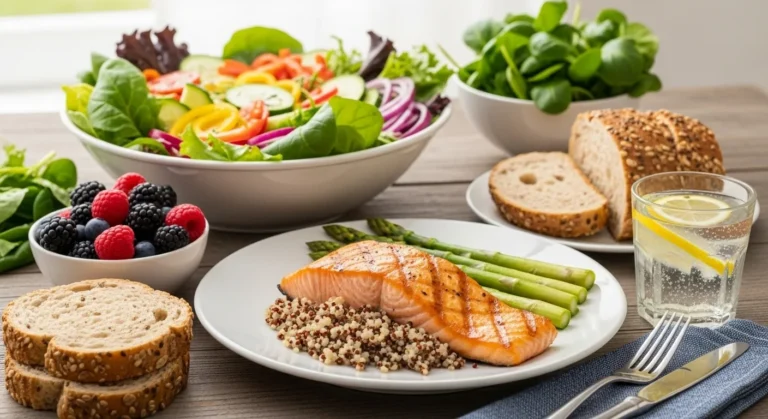Mastering Nutrition: Your Essential Guide to a Balanced Diet & Healthy Living
In today’s fast-paced world, the concept of ‘eating healthy’ often feels overwhelming, bombarded as we are with conflicting dietary advice and trendy diets. However, at its core, good nutrition is simple: it’s about providing your body with the essential nutrients it needs to function optimally, prevent disease, and maintain overall well-being. Far beyond just weight management, what you eat impacts your energy levels, mood, immune system, and long-term health. This comprehensive guide aims to demystify nutrition, offering clear, actionable insights into building a balanced diet that is both enjoyable and sustainable. Let’s embark on a journey to understand how the food choices we make profoundly shape our health and vitality
Understanding the Core: What Constitutes a Truly Balanced Diet?
A balanced diet isn’t about restriction; it’s about inclusion and variety. It means consuming a wide array of foods that provide all the necessary macronutrients (carbohydrates, proteins, fats) and micronutrients (vitamins, minerals), along with fiber and water. Carbohydrates, found in whole grains, fruits, and vegetables, are your body’s primary energy source. They fuel your brain and muscles, so opting for complex carbs provides sustained energy and essential fiber. Proteins, abundant in lean meats, fish, beans, and nuts, are crucial for building and repairing tissues, enzyme production, and immune function. Ensuring adequate protein intake helps maintain muscle mass and promotes satiety.
Healthy fats, from sources like avocados, nuts, seeds, and olive oil, are vital for hormone production, nutrient absorption, and protecting organs. They are calorie-dense, so moderation is key, but they are indispensable for health. Micronutrients, though needed in smaller amounts, play hundreds of roles in the body, from bone health (calcium, vitamin D) to vision (vitamin A) and energy metabolism (B vitamins). The best way to get a full spectrum of vitamins and minerals is through a diverse diet rich in colorful fruits and vegetables. Finally, fiber, found in plant foods, aids digestion, helps regulate blood sugar, and contributes to heart health. Water is often overlooked but is fundamental for every bodily function, from regulating temperature to transporting nutrients.

Implementing Healthy Habits: Practical Tips for Everyday Nutrition
Translating nutritional knowledge into daily practice can seem daunting, but even small, consistent changes can lead to significant improvements. One of the most effective strategies is meal planning. Dedicate some time each week to plan your meals and snacks, create a grocery list, and even do some batch cooking. This reduces stress, saves time, and prevents impulsive unhealthy food choices. Portion control is another critical aspect. Even healthy foods can contribute to weight gain if consumed in excess. Use smaller plates, listen to your body’s hunger and fullness cues, and be mindful of serving sizes, especially for calorie-dense items.
Reading food labels empowers you to make informed decisions. Pay attention to ingredients lists, looking for whole, unprocessed foods at the top. Be wary of added sugars, unhealthy fats, and excessive sodium. Hydration is non-negotiable; aim for at least 8 glasses of water daily, more if you’re active. Carry a water bottle as a reminder. Mindful eating involves paying attention to your food, savoring flavors, and eating slowly without distractions. This helps you recognize satiety signals and enjoy your meals more. Remember, healthy eating is a journey, not a destination. It’s okay to have occasional treats, but focus on consistency and making nutritious choices the norm. If you’re struggling, consider consulting a registered dietitian or nutritionist for personalized guidance.
Frequently Asked Questions
What’s the best diet for sustainable weight loss? The most effective diet for sustainable weight loss is one that you can adhere to long-term. It typically involves a moderate calorie deficit, rich in whole foods, lean proteins, healthy fats, and complex carbohydrates, along with regular physical activity. Are nutritional supplements necessary for a healthy diet? For most healthy individuals consuming a balanced, varied diet, supplements are not strictly necessary. They can be beneficial in cases of specific deficiencies, dietary restrictions (e.g., vegan), or certain life stages (e.g., pregnancy). Always consult a doctor before starting supplements. How much water should I really drink in a day? A general recommendation is about 8 glasses (2 liters) of water per day, but individual needs vary based on activity level, climate, and health status. Listen to your body and drink when thirsty; urine color is a good indicator of hydration. Is it okay to have ‘cheat meals’ or ‘treats’? Yes, occasional treats or ‘cheat meals’ can be a healthy part of a balanced diet, fostering sustainability and preventing feelings of deprivation. The key is moderation and ensuring they don’t derail your overall healthy eating patterns. How can I make healthy eating more affordable? Plan your meals, cook at home more often, buy seasonal produce, purchase staples in bulk, and utilize sales. Legumes, whole grains, and frozen fruits/vegetables are nutritious and budget-friendly options.
Conclusion
Embracing good nutrition is one of the most powerful steps you can take toward a healthier, more vibrant life. It’s not about achieving perfection, but about making conscious, consistent choices that nourish your body and mind. By understanding the fundamentals of a balanced diet and implementing practical strategies like meal planning, mindful eating, and informed food choices, you can build sustainable habits that serve you for years to come. Remember, every meal is an opportunity to fuel your body with goodness. Start small, be patient with yourself, and celebrate every step you take towards a healthier you. Your body will thank you for the care and attention you invest in its well-being.

